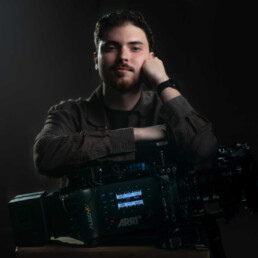Writer-director Nick Azzaro, who bridges his Italian roots with his life in Los Angeles, delves into the complexities of identity and belonging in his new short film, Alpha 27. The film embodies his personal journey through opposing worlds and highlights the power of human connections, capturing the tensions between different identities and the quest for a sense of home.
In our exclusive interview, Azzaro reflects on his return to the HollyShorts Film Festival and the emotional responses the film elicited. He discusses how resourcefulness and collaboration played crucial roles in achieving high production value despite budget constraints, and his hopes for how the film will resonate with audiences by conveying a message of resilience and the enduring strength of love amidst life’s uncertainties.
Cinemacy: It’s a pleasure to meet you, Nick! Congratulations on your short film Alpha 27 being selected to play at the 2024 HollyShorts Film Festival. What was it like showing your film there?
Nick Azzaro: Thank you! It felt amazing to be back at HollyShorts for the second year after screening my short film Retrieval in 2021. This time, I was lucky to have a primetime slot, and it was incredible to see Alpha 27 screened in front of a full audience in such a fantastic auditorium. The film looked and sounded perfect on the big screen!
It was my first time attending a public screening of Alpha 27, so it was incredibly rewarding to witness the audience’s reactions firsthand. You could feel the emotion in the room, and hearing people sob during the film was truly special. It was also great to be accompanied by other amazing films, and having many friends and collaborators show up to support made it even more memorable.
Cinemacy: You’ve said that Alpha 27 is a deeply personal narrative connected to your journey as an international filmmaker. Can you elaborate on how your own experiences influenced your vision for Diego’s character and his journey? Were there any particular moments or emotions you wanted to capture based on your own life?
Nick Azzaro: Alpha 27 is indeed a deeply personal film, and Diego’s journey reflects some of the challenges and emotions I’ve faced in my own life as an international filmmaker living abroad. Like Diego, who is caught between two worlds (the life he’s built on Earth and his origins in a distant space colony), I’ve often found myself navigating between different cultures, environments, and expectations in my career. Diego’s struggle to protect what he has built while being recalled to his origins mirrors the tension I’ve felt between the hopes of forging a new path and the concerns of an uncertain future.
One particular emotion I aimed to convey was the fear of losing what you are blessed to have. In Diego’s case, it’s his life on Earth and his partner, and, likewise for me, it’s the creative and professional journey I’ve embarked on and the close relationships I’ve built through the years. There’s a sense of resilience in Diego’s character, which I relate to—the determination to face challenges head-on and the hope that, despite the odds, you can protect what’s important to you. Overall, Alpha 27 is not just a science fiction story, but also a reflection of my own experiences, fears, and hopes, translated into Diego’s narrative.
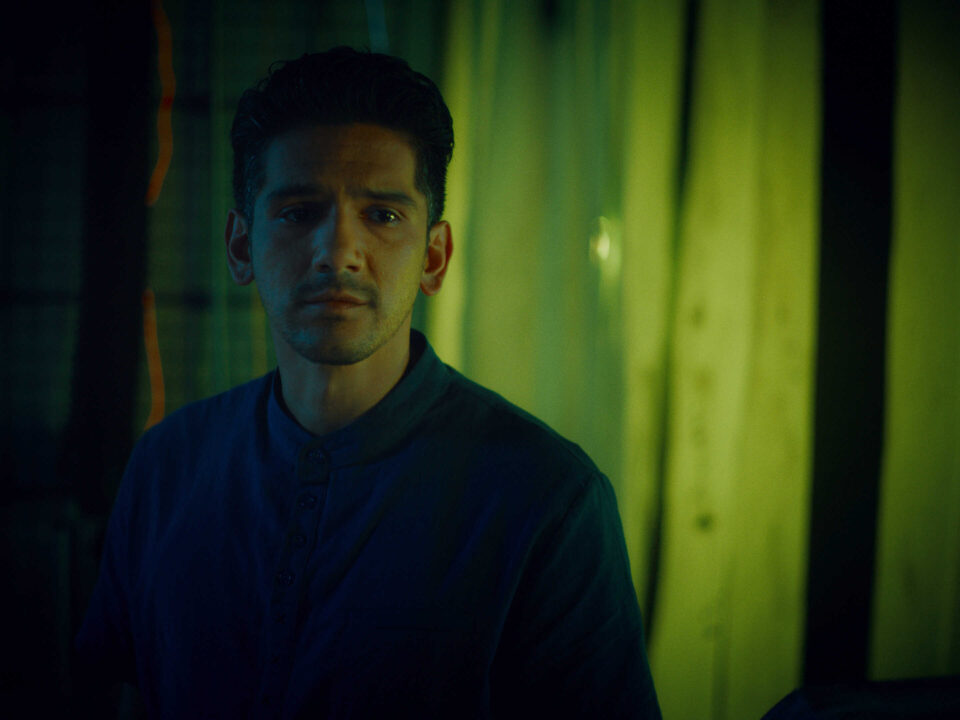
Cinemacy: The central relationship between Diego and Marcus is portrayed so beautifully. How did you want their relationship to convey the themes of identity, love, and belonging in the film?
Nick Azzaro: Diego and Marcus’s relationship is the emotional core of Alpha 27. Their connection goes beyond the typical romantic bond; it’s about two people who have found a sense of home in each other. Their relationship is a safe space where Diego can truly be himself.
In portraying their bond, I aimed to show how love can be a grounding force and that identity is not just about where we come from, but also about the connections we choose to nurture. Their love story is one of resilience, about the importance of finding belonging in the people we share our lives with, even when the world tries to pull us apart.

Cinemacy: What was the collaborative process like with your cast and crew while making the film?
Nick Azzaro: The collaborative process on Alpha 27 was a blend of trust, preparation, and creative synergy. With the actors, we spent a significant amount of time in rehearsals to develop the chemistry needed for their relationships to feel authentic. We worked together to find blocking that felt natural and ensured they were in the right mindset for their characters, especially knowing that our time on set would be limited. We workshopped the intentions behind each scene, making sure every emotional beat was clear. I trusted the actors completely, and they delivered touching performances, sometimes even nailing it in a single take, which speaks to their talent and preparation.
On the crew side, I was fortunate to work with many familiar faces. Most of the crew had been with me on previous projects, which made the process smoother and more efficient. My longtime collaborator, Destinee Easley, designed the costumes, helped as an acting coach, and served as a second pair of eyes while I was juggling both directing and cinematography. We had extensive discussions about the film’s color palette, and she selected outfits that perfectly matched the emotional tone and visual style we wanted to achieve.
I also brought back composer Jacob Tardien and sound designer Ugo Derouard, who had worked with me on Retrieval. Their contributions were invaluable once again. They not only understood my vision but also brought their own creative insights, elevating the film to a whole new level. It was a true team effort, and I’m grateful for the dedication and talent everyone brought to the project, including the many crew members who volunteered their time and energy.
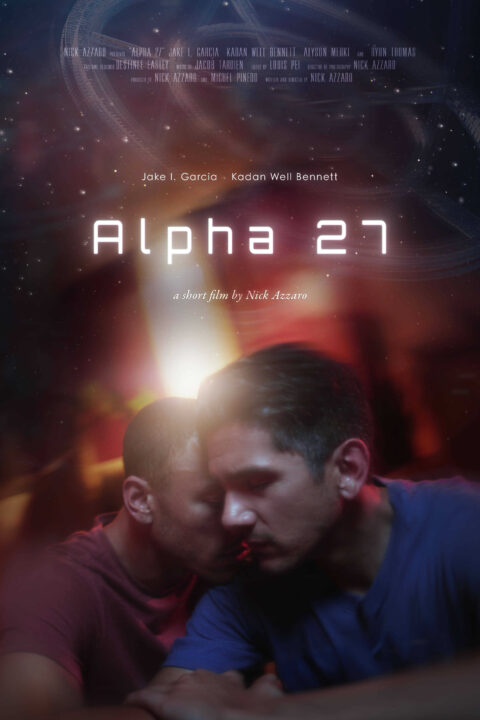
Cinemacy: The film contrasts Earth and Alpha 27 visually and thematically so exceptionally. How did you and your production team approach the design of these two worlds?
Nick Azzaro: Designing the contrasting worlds was a critical part of the storytelling in the film. Even though we never get to see Diego’s life on Alpha 27, I wanted to visually and thematically represent the differences between these two environments, reflecting Diego’s internal conflict. For the house, I wanted to create a warm, inviting environment that reflects Diego’s sense of home and belonging. I used natural, earthy tones and soft ambient light to evoke a sense of comfort and familiarity, underscoring the emotional connection Diego has to his life there, especially with Marcus.
The goal was to make Earth feel like a place where Diego’s identity has flourished, contrasting the colder, more sterile futuristic environments that remind Diego of his colony. The immigration facility and the departures bay were designed to feel oppressing, stark, and clinical. I leaned into a more stylized color palette, using greens and blue tones to evoke the distant, almost alienating nature of the space colonies. The lighting was deliberately harsh and artificial, creating a sense of detachment and unease. I wanted the audience to feel the emotional distance Diego experiences when he’s preparing to leave for Alpha 27, making his internal conflict more palpable.
Being both the director and the cinematographer on the film gave me a unique advantage in having full control over my creative vision. This dual role allowed me to seamlessly align the visual storytelling with the emotional and narrative beats of the film, ensuring that each scene visually reflected the mood and themes I wanted to convey. It also facilitated a close collaboration with other departments, ensuring that every element was perfectly in sync with the film’s overall aesthetic and tone.
Cinemacy: What were some creative solutions you used to achieve the high production values despite budget constraints?
Nick Azzaro: From the beginning, I knew the goal was to create an intimate film rather than a sci-fi spectacle, which led to several creative choices that helped us achieve a higher production value despite the very limited budget. I chose the 4:3 aspect ratio specifically to favor close-ups and performances over elaborate establishing shots. I wanted the audience to stay close to Diego, experiencing what goes on in his mind throughout the film, and only focusing on the world around him when it was essential to the story.
Lighting played a crucial role in conveying Diego’s emotional state, with brightness and color carefully selected to reflect his feelings in each scene. We scheduled our shooting days carefully, prioritizing scenes that required more elaborate setups to ensure we had the time and resources to execute them properly.
To achieve the futuristic visuals of Alpha 27 within our budget, I leaned on extensive VFX work. I used visual effects not only for the detailed holograms, but also in more subtle ways, like painting out equipment or enhancing existing set elements. This approach allowed us to achieve a polished look without breaking the budget, ensuring that the end result stayed as close as possible to my original vision.
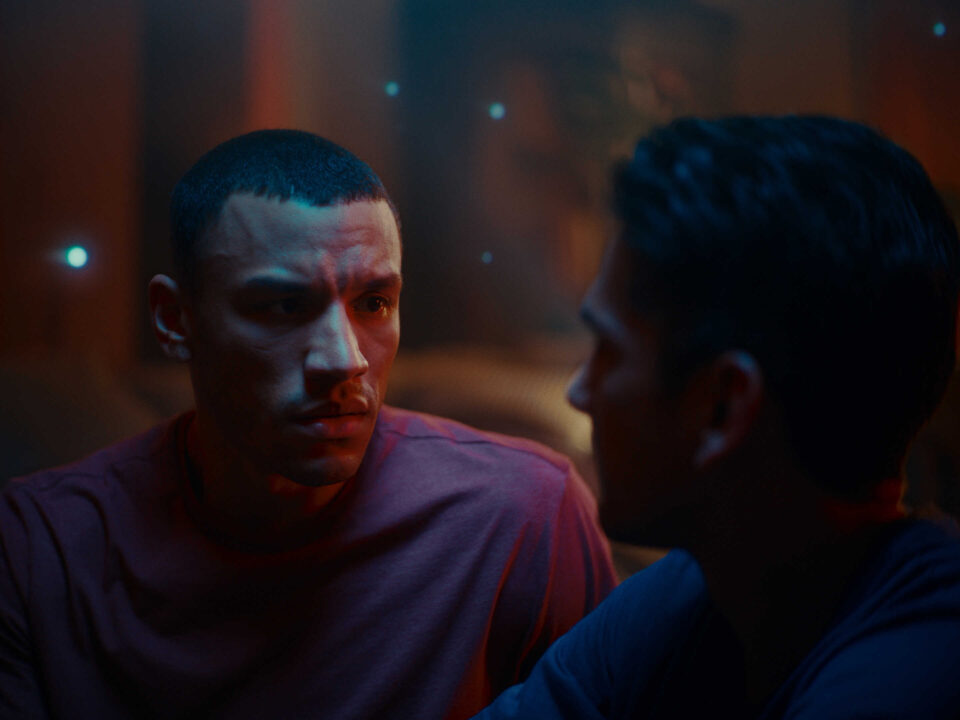
Cinemacy: You describe Alpha 27 as an ode to the enduring power of love and human adaptability. What message do you hope audiences take away from the film?
Nick Azzaro: The film explores how, even in the face of seemingly insurmountable challenges (like being forced to leave behind everything you’ve ever cared about), love can remain a constant, grounding force. Diego’s journey is a testament to the idea that while external circumstances may change, our connections and emotional bonds have the strength to transcend those changes. I want viewers to reflect on how love and resilience can guide us through life’s most difficult moments, offering hope and a sense of purpose even in the midst of uncertainty.
Cinemacy: How do you view the role of indie filmmaking in today’s cinematic landscape, especially in the context of competing with major studio productions?
Nick Azzaro: Indie filmmaking offers a platform for originality and diverse storytelling. It provides a bigger opportunity for talented voices to emerge, particularly those from underrepresented backgrounds, fostering inclusion and diversity in ways that larger studios sometimes overlook.
The budgetary constraints of indie films encourage creative problem-solving, pushing filmmakers to think outside the box, and leading to innovative and unique narratives. One of the greatest advantages of indie filmmaking is the creative control it affords, allowing filmmakers to craft more personal, authentic stories that resonate on a deeper level with audiences. Personally, I enjoy both indie and studio films, and I believe each has its strengths.
While indie films offer the freedom to tell more intimate and original stories, studio films provide the resources to reach wider audiences. I would love to be part of both worlds, bringing the lessons and creativity from indie filmmaking into larger productions and vice versa.
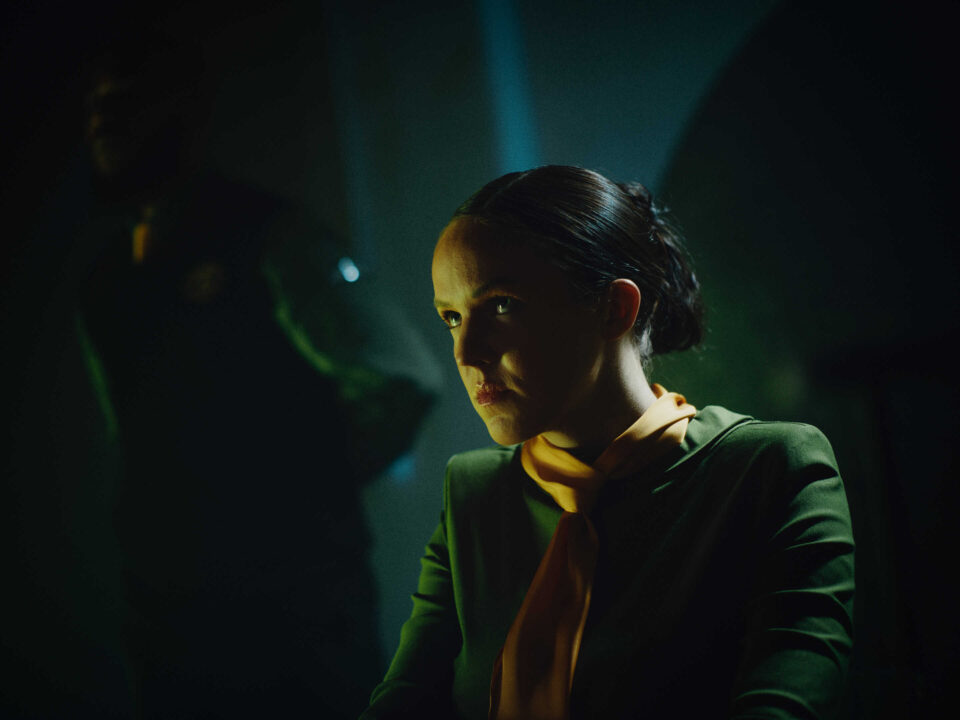
Cinemacy: In your opinion, what are the most important qualities or skills that indie filmmakers should develop to succeed in a competitive market?
Nick Azzaro: Adaptability is crucial. Filmmakers often face unexpected challenges, from budget constraints to last-minute changes, so being able to pivot and find creative solutions is essential. Inventiveness goes hand in hand with this; using limited resources to achieve a compelling story can set you apart.
Enthusiasm is also one of the most contagious and important qualities you can have. It drives the project forward and motivates everyone involved. Forget about trying to be fancy and focus on telling stories with heart and intention. Audiences resonate with authenticity, so putting genuine emotion and purpose into your work is key.
Finally, don’t be afraid to try new things! Embrace that spirit of exploration, and you’ll find that taking risks can lead to the most rewarding experiences and opportunities.
Cinemacy: How do you balance staying true to your creative vision with the practical realities of indie filmmaking, such as budget limitations? What advice do you have for filmmakers navigating this balance?
Nick Azzaro: It’s a delicate blend of realism and creativity. It’s important to be realistic with your vision and expectations. When you’re approaching a project, it’s common to start with a wishlist that includes all the big, fancy ideas you can think and dream of. But once that’s done, you need to strip it down to the core of the story and what’s best for it, considering what’s actually achievable with the resources you might have.
That said, don’t let limitations hold you back. Instead, use them to your advantage. Often, constraints force you to think outside the box, leading to creative solutions that can be even more effective than the “regular approach.” Limitations can push you to discover new ways of telling your story that are not only more practical but also more original and impactful.
My advice to filmmakers is to embrace these constraints. Be open to adapting your vision without compromising the heart of your story. It’s not about what you can’t do, but about making the most of what you can do.

